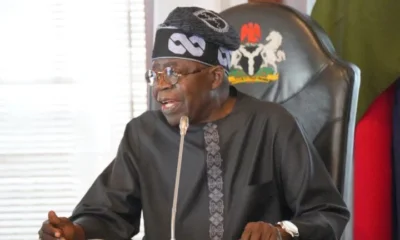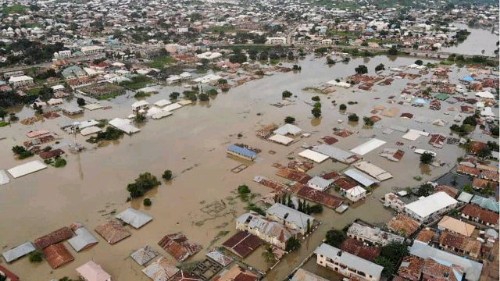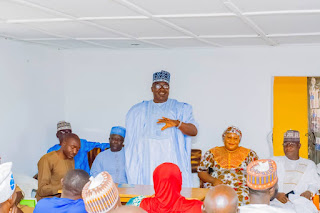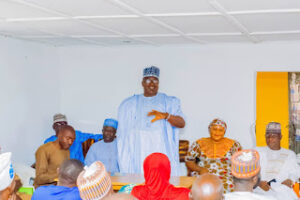State governments have directed residents living around flood plains and erosion spots to vacate these danger zones before it is too late.
The advisory is coming against the backdrop of the heavy rainfall predicted for July in some states even as the Federal Government also sounded a warning to the citizens living near natural waterways, flood plains, and erosion spots.
In a statement on Wednesday, the National Emergency Management Agency warned that 14 states and 31 communities might witness heavy rainfall that could lead to flooding from July 4 to July 8.
The Territorial Coordinator, NEMA, Lagos Territorial Office, Mr Ibrahim Farinloye Farinloye, urged relevant stakeholders within the states concerned to take precautionary measures to forestall the loss of lives and property.
The communities are Langtang, Shendam in Plateau State; Sumaila, Tudun Wada in Kano; Shagari, Goronyo, Silame in Sokoto; Okwe, Delta State; Kachia, Kaduna State; Upenekang in Akwa Ibom; Mubi, Demsa, Song, Mayo-Belwa, Jimeta and Yola in Adamawa State and Katsina, Jibia, Kaita, Bindawa all in Katsina State.
Others include Wara, Yelwa, and Gwandu in Kebbi; Shinkafi and Gummi in Zamfara; Briyel, Borno State; Gwaram in Jigawa; Jebba, Kwara State and Mashegu, Kontagora in Niger State.
Farinloye thanked the Flood Early Warning System Central Hub of the Federal Ministry of Environment, Abuja, for sharing the information.
Flood Kills Toddler In Katsina
However, the impact of the flooding is already being felt as a one-year-old boy drowned in a downpour in Katsina on Tuesday night.
The rain began a few minutes before 4 pm and ended shortly after 10pm.
The Executive Secretary for the State Emergency Management Agency, Hajiya Binta Dangani, confirmed the incident on Wednesday.
She explained that the deceased’s mother was carrying him on her shoulder when he slipped from her hands and fell into the flood which swept him away.
The SEMA boss said, “The mother of the boy was carrying him on her shoulder while she had another baby strapped to her back. Unfortunately, the boy slipped from the mother’s shoulder and fell into the flood while efforts to rescue him failed. The house where the incident happened is close to a stream.
“So, this morning, (Wednesday), I was at the house to commiserate with the family and also to sensitize residents about the need to be careful since we are already in the rainy season.
“I also counselled residents, especially those who have houses close to rivers or streams to always stay off the streams or rivers whenever it rains. Our sensitization of residents on the havoc of flood will continue.”
Katsina Downpour
The Tuesday downpour in Katsina disrupted business activities in the state capital, especially at Kofar Kaoran Quarters where the newly constructed underpass and the surrounding offices and houses were submerged by flood.
The development led to disruption in both human and vehicular movements throughout the night.
With the onset of rains, Katsina Sokoto and Kwara State are appealing to residents to leave flood zones and clear blocked drainages.
The Katsina SEMA boss, Dangani, disclosed to our correspondent that the state would evacuate those still living along flood plains, adding that the state would not create any Internally Displaced Persons Camp.
She stated, “We are planning to evacuate those living along flood plains; we will not create any IDPs camp. We shall continue with our sensitization efforts to further enlighten residents on flooding and why people should not reside on the flood plains or be wary of building near rivers.
“I led a team this morning( Wednesday ) on a house-to-house sensitization exercise in Katsina for residents who live by the riverside and flood-prone areas. We were at the house of a woman who lost her one-year-old baby to a flood on Tuesday evening during a heavy downpour.
A staff member of the Sokoto State Emergency Management Agency, Mustapha Abubakar, explained that the agency had already created awareness in some of the communities that might be affected by possible flooding.
Mustapha noted that the state government had done all that was necessary to tackle such an incident if it eventually arose, stressing that the agency had always prepared ahead of time for it.
He said,” Sokoto State has been up-front in tackling the flood disaster. SEMA and its partners- Coopi and Christian Aid had presented this year’s flood outlook to the stakeholders and the predicted community leaders to be affected in April.
“Equally, flood awareness and early warning campaigns were conducted in Goronyo, Rabah, and Sokoto South LGAs in May.
“Yesterday (Tuesday), a simulation exercise on the menace of the flood was conducted in Goronyo and Rabah all through the assistance of Coopi and Christian Aid.’’
In Kwara State, the government was not taking things lying low as it was said to have commenced the clearing and desilting of waterways.
The Chief Press Secretary to the governor, Rafiu Ajakaye, revealed that the government had since March rolled out programmes to prevent flooding in the state in response to the predictions of flooding by NEMA and other agencies.
He said, “The government had since March rolled out various engagement and enlightenment programmes, including audiovisuals run on radio and across different new media platforms so that citizens are properly guided.
“Besides, the government has since started the clearing of drainages. There is ongoing desilting of drainages and the dredging of large water channels in the state, including the state capital.”
On the engagement with residents living in flood-prone areas, Ajakaye noted, “Of course, we cannot get tired of engaging with residents of flood-prone areas and those living along the banks of River Niger on the danger of staying put.”
A former resident of the Taiwo Isale area and flood victim, Alhaji Salawu Adisa said he had moved out of his house which was affected by the flooding from the Asa river.
“We have packed out of our house in the Taiwo Isale area since March this year following the state government’s directive. Many residents of the area have moved out. I have moved to the Oshin area in the outskirts of Ilorin with my family,’’ he explained, adding that no compensation was given to the flood victims by the state.
Also, the authorities in Delta State have urged residents in flood-prone areas to relocate to safer grounds and enjoined farmers to embark on early harvest to reduce losses.
The Permanent Secretary in the state Ministry of Agriculture and Natural Resources, Ben Agamah who advised Asaba, warned that the predicted flooding would be massive.
Agamah, who said the state government was deeply concerned about the likely devastating effects of flooding on farmers, admitted that the government cannot do much for now to save the situation.
“Delta State Government is irrevocably committed to the welfare of farmers during and after the likely flooding. The Sheriff Oborevwori administration, in the spirit of the MORE agenda, is ready to continue from where the immediate past administration stopped.
“The farmer is the king, and the state government is not unmindful of the strategic role they play in the food supply, security, and value chain of government and agricultural programmes,” he said.
Also, the traditional ruler of the Abala kingdom, Igwe Frederick Egbunokonye, stated that residents in the area had earlier been advised to plant crops that would be harvested early to avoid possible losses.
Noting that the solution to the expected flooding was not readily available, the monarch re-echoed his call for the dredging of the River Niger by the Federal Government.
On his part, the Secretary to Abagalada community, Simon Ilona, said his people were hoping that the flooding prediction would fail, maintaining that there was nothing on the ground to contain the fury of nature if it came to pass.
He added, “There is nothing we can do, there is nothing like human preparation. We don’t know whether the prediction is true or not, we are just relying on God to save us. Some predictions do fail, it does not always happen as predicted, so that is why we always rely on God.”
The chief in the community, Okwukudi Prince, said, “If the government cannot do anything; what can we, poor peasant residents do? We have left our hopes hanging, praying that God should disappoint the soothsayers.”
The people of the Ndokwa East area of the state lamented that no measure had been put in place by the state government to protect or relocate them ahead of the rains.
Mr Okwu said, “Where do you want us to go? They are saying relocate, relocate, where are we relocating to? We have been relocating every year; after the flood, we suffered from it. Our farm, building, everything perished; no incentive from the government for us.”
Meanwhile, the 7.1km Umeh Road and the bridge collapsed following two days of downpours.
Governor Oborevwori on Wednesday directed the state Ministry of Works to immediately carry out repair works on the road located in the Isoko South Local Government Area of the state.
The road was constructed by the Emmanuel Uduaghan administration in 2015 to link the community to the East-West Road and by extension, other parts of the state.
In response to NEMA’s warning, the Kebbi State government has expressed its readiness to tackle any form of flooding in the state this year.
The Chief Press Secretary to the state governor, Ahmed Idris, said Governor Nasir Idris on the assumption of office set up the machinery to tackle flooding in the state.
He said, “When the governor assumed office, he gave directives to the Kebbi State Urban Development Agency to clear all the drainages in the whole 21 local government areas of the state.
“He also gave a standing order to SEMA to support all the local communities affected by flood with relief materials to ease their sufferings.’’
Idris also said that the state had put in place measures to prevent flooding in the riverine areas in the state including Yauri, Argungu, and Birni Kebbi among others.
He further said farmers in the concerned areas had been cautioned to minimize their risk exposure.
Worried by the expected inundation, residents of Asutan Street, one of the areas affected by flooding in the Uyo Local Government Area of Akwa Ibom State have called on the state government to provide cash assistance or accommodation to enable them to relocate ahead of the rains.
Victims Lament
A local, Ms Christian Effiong, said “I have been living here for more than three years now. The government has been asking us since last year to relocate; there is no money to relocate considering the present economic realities. Now, the cost of a one-room apartment is between N5,000- N6,000 per month. I don’t have that kind of money.
“I want the state government to help us with alternative accommodation or give us money to relocate. If the government gives me money or alternative accommodation now, I will leave here.”
Another resident, Mr Christian Adamsm said they were risking everything by staying in the area because there was no money to enable them to relocate to a safer area.
“Most of us are still staying because there is no money to relocate. So, we want the state government to assist us to move before the flood becomes severe,” he pleaded.
The State Coordinator, NEMA, Dr Grace Akpan, could not be reached for comment as she was said to be in a meeting.
On what the government was doing to prevent massive flooding in the state, the Director-General of the Niger State Emergency Management Agency, Mallam Garba Salisu, explained that his agency had sensitised residents of Kontagora Local Government Area and its environs listed as flood-prone areas.
He also said the agency had mobilised men and machines to 14 areas and communities prone to flooding, including riverine settlements.
According to him, a major challenge in relocating the affected areas is that they are agrarian communities.
Meanwhile, the Senate has urged the Federal Ministry of Water Resources to revisit the proposed construction of the Dasin Hausa Dam to take in the flood waters from Lagdo Dam in Cameroon.
The Senate resolution Wednesday was a sequel to the adoption of a motion on ‘Urgent Need to Intervene in the Flooding Issues in Sagamu, Ijebu areas of Ogun-East and Edu, Patigi areas of Kwara- Noth and other parts of the country’ sponsored by Senator Gbenga Daniel (Ogun East) and Senator Umar Sadiq Suleiman (Kwara North).
Daniel in his lead debate said that the Nigerian Meteorological Agency had forecast that the level of rainfall in 2023 would surpass that of 2022.
According to him, the 2023 annual flood outlook prepared by Nigeria Hydrological Services showed that 178 Local Government Areas in 32 states and the FCT fell within the highly probable flood-risk areas.
He said Lagos, Ogun, and Kwara states, in particular, would witness coastal flooding due to the tidal lock of Ogun River by Lagos Lagoon from a natural rise in sea level, coupled with the possible release of excessive water from the Oyan dam.
Meanwhile, Vice President Kashim Shettima, on Wednesday in Abuja, assured the Jigawa State Government that the Tinubu-led administration would help to lessen the devastating flooding incidents the state suffered in the last rainy season.
“I want to convey to you the message from President Bola Tinubu that the challenges of the place will be adequately captured in the next budget”, Shettima told a delegation of the Hadeija Emirate Council led by its Emir and Chairman of Jigawa State Traditional Council, Adamu Maje, who paid him a courtesy visit at the State House, Abuja.
The State House Director of Information, Office of the Vice President, Olusola Abiola, revealed this in a statement he signed on Wednesday titled ‘Vice President Shettima restates the importance of peace for national development.’
Shettima’s words come six months after former President Muhammadu Buhari promised to provide more relief items to victims of flooding in the state.
Buhari had, in late January, taken an aerial view of some of the roads, infrastructure, bridges and places affected by the flood disaster in September 2022, which affected many parts of Jigawa State.
They include Auyo through Kafin Hausa and some parts of Miga, Jahun, Kiyawa, Dutse, and Birnin Kudu Local Government areas.
Credit: The Punch

 BIG STORY5 days ago
BIG STORY5 days ago
 BIG STORY4 days ago
BIG STORY4 days ago
 BIG STORY3 days ago
BIG STORY3 days ago
 BIG STORY4 days ago
BIG STORY4 days ago
 BIG STORY2 days ago
BIG STORY2 days ago
 BIG STORY1 day ago
BIG STORY1 day ago
 BIG STORY4 days ago
BIG STORY4 days ago
 BIG STORY4 days ago
BIG STORY4 days ago






















